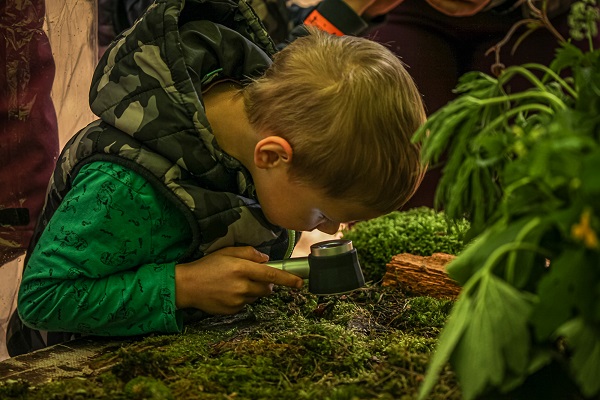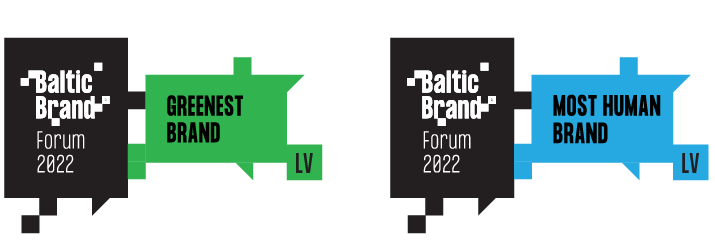Last School Year, more than 20 000 Students and Teachers Explored the Forest in LVM Environmental Education Programmes
To raise the awareness of children and young people about the value of forests and the role of sustainable forestry in mitigating climate change, in the 2021/2022 school year, JSC “Latvia's State Forests” (LVM) in cooperation with the State Education Content Centre and other organizations involved more than 20 000 students in forest education activities, from pre-school to adult further education classes.
Most participants took part in LVM's environmental education programmes for pre-schools and primary schools. 7104 preschool children and 208 teachers from all over Latvia participated in the LVM eco-programme for kindergartens “Pigman’s Detectives” last school year. At the beginning of the school year, Pigman went to the first 100 kindergartens to deliver his “Secret Bags” with teaching materials, in the middle of the year – to give “Oxygen Packs” to each group – tree growing kits, and at the end of the year, he awarded detective diplomas. The programme is implemented with the financial support of the Latvian Environmental Protection Fund within the project “Do not Litter the Forest”.
This year, 255 classes and interest education groups have participated in the LVM environmental education programme for grades 1–6 “Mother Nature Master Class”, involving 4 075 children and young people and more than 200 teachers in exploring the forest. This year, 75 classes and groups received master's diplomas for all three completed master works, and 50 apprentices' diplomas – for completing two or one master work. Each of the classes also received a diploma in the international “Learning about Forests” programme.
More participants than last year have participated in the annual LVM Forest Expeditions for 6th grades. Last autumn, 5 614 sixth-graders and 436 of their teachers took part in them. In September, 304 groups visited 11 expedition landfills, which are more than 160 LVM employees educating about sustainable forest management. In turn, 7th-9th grades had an opportunity to participate in the annual outdoor educational competition LVM Forest Game. 112 students from 13 schools made it to the semi-finals. Līga Abizāre, LVM Environmental Education Manager: “This year, we organized the LVM Forest Game together with the Latvian Olympic Committee, highlighting the forest as the largest gym. In the finals of the orienteering competition and creative tasks, Jelgava Pārlielupe Primary School was the winner of the orienteering competition, Mazzalve Primary School ranked second followed by Mežinieki Primary School ranking third.”
Secondary school students participated in the scholarship competition “LVM Bio-economy School”. In the first round of the competition, 23 works were received from 21 authors. In the 3rd round, 14 candidates participated in sending video messages in honour of the UN International Forest Day; seven finalists received scholarships from LVM and cooperation partners: JSC “Latvijas Finieris”, SIA “Rīgas meži” and the association “Zaļās mājas”.
The biggest novelty of this year in the school programme was the digital game “Mežotājs” for 8th – 9th grades. More than 3 000 students have already played the research game “Mežotājs”. The 8th grade of Mārupe Primary School, the 8th grade of Galēni Primary School and the 9th grade of Mežvidi Primary School were announced as the winners of the digital and field research in the forest.
Also this year, the theme “Oxygen” was brought to life by students, giving schools a new methodological material on climate change – the Oxygen Package – with tree seeds and a sowing guide. In total, educational institutions received more than 18 000 pine seeds. When receiving the “Oxygen Package”, everyone between the ages of 5 and 19 was also invited to create a design for the oxygen theme sticker. A huge number of applications has been received for the competition – almost 1000! Together with the Imants Ziedonis Foundation's “Viegli” educational initiative “Ziedoņa klase” (Ziedonis’ Class), four students received the main prizes, and three more received recognition.
To provide teachers with professional development in the study process about the forest, several in-service teacher training courses were held last school year. More than 200 teachers from all over Latvia have taken part in the autumn and spring courses. The next courses are scheduled for the end of July 2022 as a three-day environmental education camp for the most active teachers who have worked diligently with students in LVM's environmental education programmes.
This year's environmental education activities have been implemented together with cooperation partners: State Education Content Centre, the Interdisciplinary Centre for Educational Innovation at the University of Latvia, International Environmental Education Foundation (FEE) programme “Learning about Forest”, Latvian Environmental Protection Fund and other partners. LVM has been implementing environmental education programmes since 2005 in accordance with the national education standard and the European Forest Pedagogy Guidelines (www.forestpedagogics.eu). For more information, please visit www.lvm.lv/skolam
Teachers' feedback on the LVM school programmes in the 2021/2022 school year:
Laurenči Primary School:
The “Oxygen Pack” is great! First, we got acquainted with the information, researched the content and were very happy about such a gift from JSC “Latvia's State Forests”. Thanks for the climate change game and the pine seeds! According to the instructions, we sowed pine trees on 13 April; they are already growing very well and have sprouted well, we watch and have fun every day.
Kandava Kārlis Mīlenbahs Secondary School:
I highly value the research game “Mežotājs” as a digital learning and methodological tool on sustainable forestry because the students had the opportunity to understand the application of theoretical knowledge in everyday life through real examples of digital games. In turn, the research was an excellent example of good practice for the development of the “School 2030” lessons.



